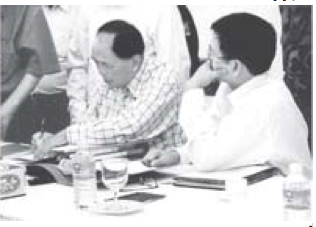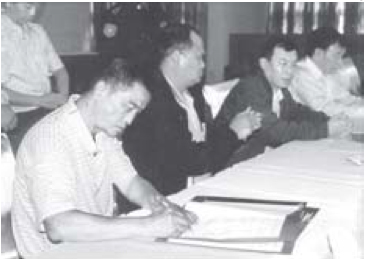The two armed groups that had been at loggerheads with Burma Army over Naypyitaw’s Border Guard Force (BGF) program launched in 2009, United Wa State Army (UWSA) and National Democratic Alliance Army (NDAA) reportedly signed a new ceasefire agreement with the new civilianized government, according to highly-placed sources on the Sino-Burma border.
 “The proposal looks fine, so we have signed it. Essentially, it is like the agreement we concluded in 1989,” said an officer from Mongla who was also in the recent meeting with the regime negotiators.
“The proposal looks fine, so we have signed it. Essentially, it is like the agreement we concluded in 1989,” said an officer from Mongla who was also in the recent meeting with the regime negotiators.
The said proposal was presented when the two sides [armed groups and government’s negotiators] met in Kengtung, Shan State East capital following the government’s invitation letter to the groups [Mongla and UWSA] for peace talks. However the groups were invited to meet separately.
The UWSA delegates led by Bao Youliang met the government’s delegates; Union Solidarity Development Party (USDP) general secretary U Aung Thaung and U Thein Zaw, Chairman of the Lower House National Races and Internal Peacekeeping Committee on 6 September. Mongla delegation led by Vice Chairman Hsan Per and its general secretary Sao Hsengla met on the next day, but the proposal presented to the groups was said to be the same, said the officer.
The proposal contain four points: no hostilities between the two sides, to reopen liaison offices on both sides; to inform each other in advance if one side is entering the other side’s territory carrying arms and to form a joint coordination committee for regional development as soon as possible.
Yesterday, SHAN reported that apart from the above four points, there was another one which says to maintain Mongla’s autonomous status.
 Regarding this point, the officer said, “They [government representatives] said we can freely run our region as we have been. But it is not included in the agreement.”
Regarding this point, the officer said, “They [government representatives] said we can freely run our region as we have been. But it is not included in the agreement.”
The two groups: UWSA, Mongla together with other armed groups like Shan State Army (SSA) North, and Kachin Independence Army (KIA) were have been labeled as illegal associations following their rejection of Naypyitaw’s BGF program which would have put all the armed groups under Burmese military command.
Asked what had prompted Naypyitaw representatives, instead of Shan State Government representatives, to come to Kengtung, the source said, “It was because of our letter on 27 August welcoming the 18 August announcement inviting us for peace talks. We had also expressed our desire to resume our negotiations in the letter.”
Asked why Naypyitaw had no longer insisted that the Wa and Mongla become Border Guard Forces (BGFs) as demanded earlier, he said, “We put the same question to the Burmese representatives and they said it was the previous military government’s program.”
But tensions with the KIA and SSPP/SSA still remain high and reports of clashes between the two sides have been ongoing up to now since March with the SSA and since June with the KIA.


